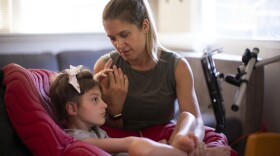
Emily Harris
International Correspondent Emily Harris is based in Jerusalem as part of NPR's Mideast team. Her post covers news related to Israel, the West Bank and Gaza Strip. She began this role in March of 2013.
Over her career, Harris has served in multiple roles within public media. She first joined NPR in 2000, as a general assignment reporter. A prolific reporter often filing two stories a day, Harris covered major stories including 9/11 and its aftermath, including the impact on the airline industry; and the anthrax attacks. She also covered how policies set in Washington are implemented across the country.
In 2002, Harris worked as a Special Correspondent on NOW with Bill Moyer, focusing on investigative storytelling. In 2003 Harris became NPR's Berlin Correspondent, covering Central and Eastern Europe. In that role, she reported regularly from Iraq, leading her to be a key member of the NPR team awarded a 2005 Peabody Award for coverage of the region.
Harris left NPR in December 2007 to become a host for a live daily program, Think Out Loud, on Oregon Public Broadcasting. Under her leadership Harris's team received three back to back Gracie Awards for Outstanding Talk Show, and a share in OPB's 2009 Peabody Award for the series "Hard Times." Harris's other awards include the RIAS Berlin Commission's first-place radio award in 2007 and second-place in 2006. She was a John S. Knight fellow at Stanford University in 2005-2006.
A seasoned reporter, she was asked to help train young journalist through NPR's "Next Generation" program. She also served as editorial director for Journalism Accelerator, a project to bring journalists together to share ideas and experiences; and was a writer-in-residence teaching radio writing to high school students.
One of the aspects of her work that most intrigues her is why people change their minds and what inspires them to do so.
Outside of work, Harris has drafted a screenplay about the Iraq war and for another project is collecting stories about the most difficult parts of parenting.
She has a B.A. in Russian Studies from Yale University.
-
In 2022, schools recouped $6.6 billion from federal and state Medicaid programs for student healthcare. They could be getting much more.
-
Fifty years ago, Title IX banned discrimination based on sex in educational institutions. College sports had to change. This is the story of how four women fought to make that happen.
-
A brief — and camisole — history behind the conflict over labeling products that are made in the West Bank.
-
Most of the police you see on the streets in Israel are actually citizen volunteers. They outnumber the country's 30,000 professional officers.
-
Hamas police say male driving instructors can't teach female students without a chaperone present. Some teachers have been suspended. But one driving school owner says the policy is good for business.
-
Prime Minister Benjamin Netanyahu has named hard-liner Avigdor Lieberman his new defense minister, a move that has ignited a fierce debate inside Israel and beyond.
-
Home prices have climbed by 80 percent over the past eight years, burdening many Israelis. Policy makers are trying to bring prices down and offering new lotteries for first-time home buyers.
-
At mosques across Egypt, worshippers prayed on Friday for those killed when an EgyptAir plane plunged into the Mediterranean a day earlier. The cause of the crash still isn't known.
-
France has sent warships, aircraft and aviation investigators to help find the cause of Thursday's crash of EgyptAir flight 804. The flight vanished from radar screens over the eastern Mediterranean.
-
Egyptian officials are urging the world to await facts before concluding what brought down a Cairo-bound airliner. But families and the public clamor for news about another Egyptian aviation incident.





